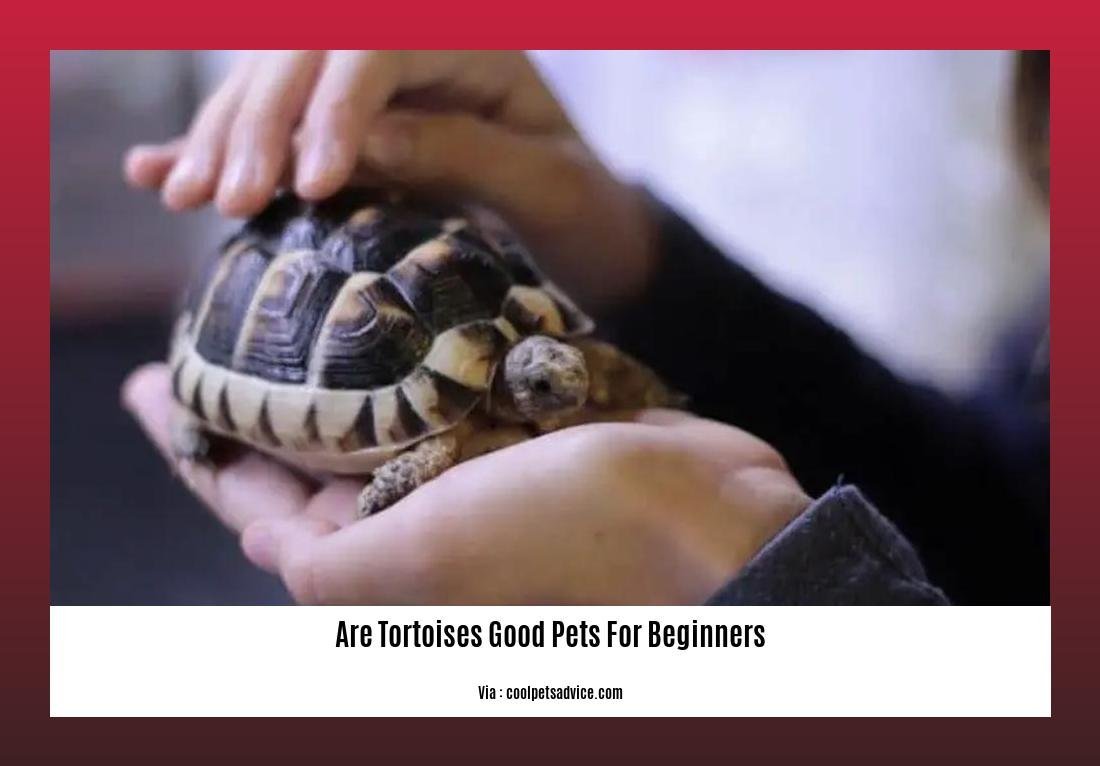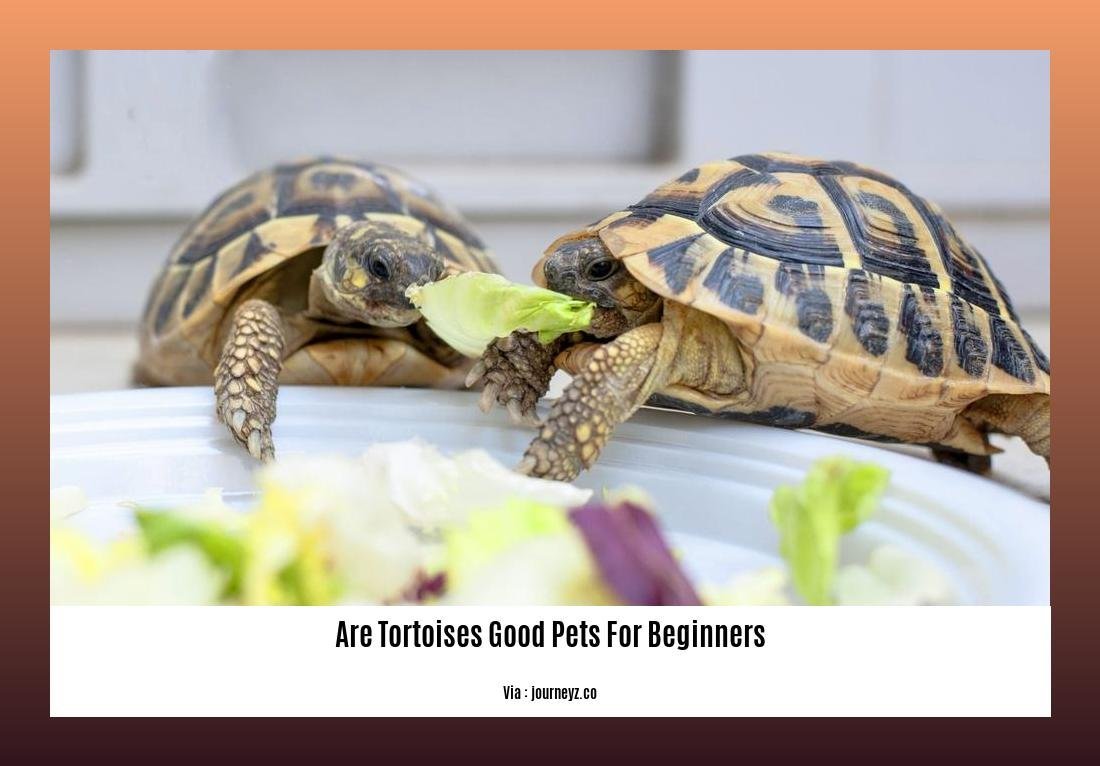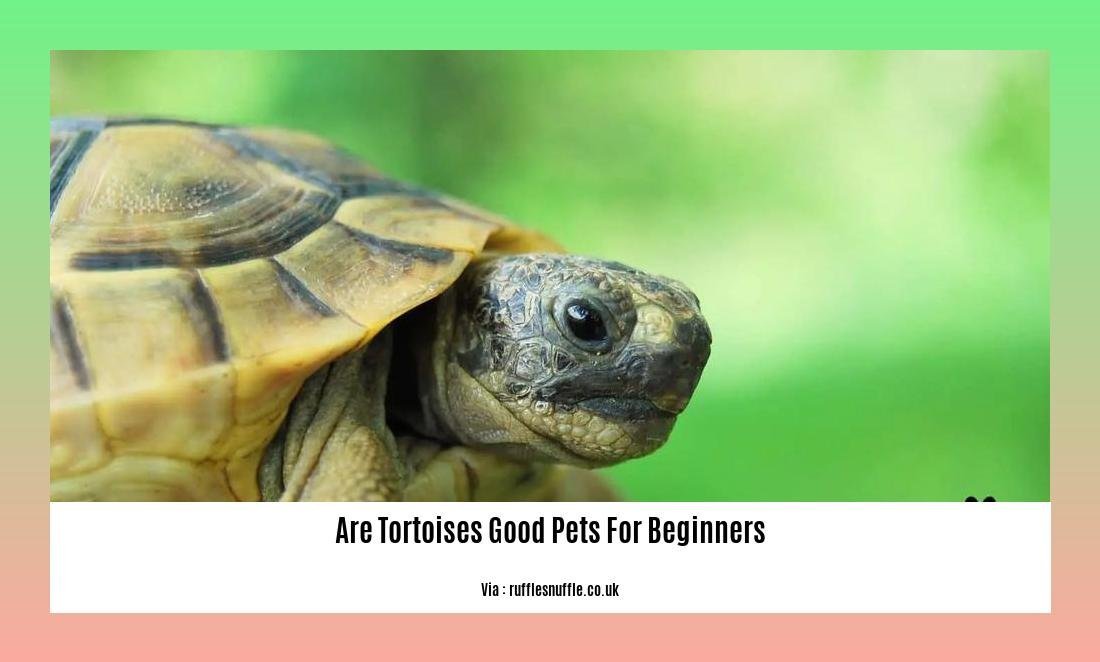Are Tortoises Good Pets for Beginners? The Expert Guide to Tortoise Ownership for Novice Pet Owners
Are you a beginner looking to embark on the rewarding journey of pet ownership? If so, you may be wondering if tortoises are suitable pets for beginners. Look no further – this expert guide is here to provide you with invaluable insights into the world of tortoise ownership. As an experienced reptile enthusiast and author specializing in beginner pet ownership, I am here to help you explore the pros and cons of having a tortoise as a captivating companion. From their unique needs and temperament to the essential maintenance requirements, this article will equip you with the knowledge needed for a successful and fulfilling experience as a novice tortoise owner. So, let’s dive in and discover if tortoises are indeed good pets for beginners.
Key Takeaways:
- Tortoises are quiet, attractive, hearty, and easy-to-care-for reptiles.
- They are relatively small and do not shed fur.
- Tortoises have a long lifespan.
- They are hypoallergenic and omnivorous.
- However, tortoises require a large outdoor space, a controlled enclosure, and climate.
- They are not suitable for short-term ownership.
- Before buying a tortoise, make sure it is legal in your country and captive-bred.
Are Tortoises Good Pets for Beginners?

Tortoises are fascinating creatures that can make excellent pets for beginners. With their unique characteristics and low-maintenance care requirements, they offer a captivating ownership experience. In this article, we will explore why tortoises are good pets for beginners and what you need to know before bringing one into your home.
Quiet and Attractive Companions
When considering a pet, many people prefer a quiet and peaceful environment. Tortoises fit perfectly into this category as they are incredibly quiet animals. They won’t disturb you with noisy barks or meows, making them ideal for individuals seeking a serene atmosphere.
In addition to being quiet, tortoises are visually attractive pets. With their stunning shell patterns and slow movements, they add a touch of elegance to any living space. Watching a tortoise gracefully navigate its surroundings can be a mesmerizing sight and a source of relaxation.
Hearty and Easy-to-Care-For Pets
For beginners, tortoises are a great choice because they are hearty and relatively easy to care for. Unlike some other pets, they don’t require excessive attention or intricate care routines. Basic food and water, a safe enclosure, and suitable lighting are usually sufficient to keep them healthy.
Their low-maintenance nature means you won’t have to invest a significant amount of time and effort into their care. This makes tortoises an ideal option for individuals with busy schedules or those who prefer a more hands-off approach to pet ownership.
Long Lifespan for Lifelong Companionship
One of the most appealing aspects of owning a tortoise is their remarkable longevity. These creatures can live for several decades, sometimes even surpassing a hundred years. This makes them perfect for individuals looking for a long-term companion.
By committing to a tortoise as a pet, you are embarking on a long and rewarding journey. You’ll have the opportunity to create a deep bond and witness their growth and development over the years. This longevity ensures that your tortoise can be a loyal and constant presence in your life.
Hypoallergenic and Omnivorous Diet
Some individuals struggle with pet allergies, but tortoises offer a hypoallergenic solution. They do not produce fur or dander that can trigger allergic reactions, making them suitable for those with sensitivities.
Tortoises also boast an omnivorous diet, consuming both plants and small insects. This variety in their diet provides flexibility and ensures they receive the necessary nutrients. You’ll have the opportunity to experiment with different foods and observe their preferences, adding an element of excitement to their feeding routines.
Outdoor Space and Controlled Environment Requirements
While tortoises make great pets for beginners, it’s important to consider their space and environment requirements. Tortoises need a large outdoor space where they can roam and explore. Creating a controlled and secure enclosure that offers ample space is essential to their well-being.
In addition to outdoor space, tortoises require a controlled environment that mimics their natural habitat. This may include maintaining specific temperature and humidity levels to ensure their comfort and health. Proper lighting and access to fresh water are also crucial elements to consider when setting up their enclosure.
Not Suitable for Short-Term Ownership
Tortoises are not suitable for individuals seeking short-term pet ownership. As mentioned earlier, they have a long lifespan and require consistent care and attention. Owning a tortoise is a long-term commitment that should not be taken lightly.
Before considering a tortoise as a pet, reflect on your ability to provide the necessary care for many years to come. Ensure you are prepared for the responsibility and the investment of time, resources, and emotional commitment that comes with tortoise ownership.
In Conclusion
In conclusion, tortoises are indeed good pets for beginners. They offer a quiet and attractive companionship that can bring joy and tranquility to your life. Their hearty nature and low-maintenance care requirements make them suitable for individuals with busy lifestyles or those looking for a more hands-off pet ownership experience. However, it’s important to consider their space and environment needs, as well as the long-term commitment they require. By understanding and meeting these requirements, you can provide a loving and fulfilling home for your tortoise companion.
If you’ve ever wondered if snapping turtles are friendly creatures, we’ve got the answer for you. Find out more about their temperament and behavior here.
Are tortoises dangerous to humans? Discover the truth about their potential hazards and how to ensure your safety around them here.
3. Care Requirements for Tortoises

Tortoises are fascinating creatures that can make great pets for beginners. However, it’s important to understand their specific care requirements to ensure a successful and fulfilling ownership experience. In this article, we will explore the key elements of care that every tortoise owner should know.
Habitat and Enclosure
When it comes to providing a suitable habitat for your tortoise, size really does matter. Tortoises need ample space to roam and explore, so a large outdoor enclosure is essential. The enclosure should be secure and predator-proof, with sturdy walls and a secure lid or fence to prevent escape.
Inside the enclosure, it’s important to create a controlled environment that mimics the tortoise’s natural habitat. This includes providing a sheltered area for shade, as well as a basking spot with a heat source for the tortoise to regulate its body temperature. A substrate that allows for burrowing, such as topsoil or sand, is also recommended.
Temperature and Lighting
Tortoises are ectothermic animals, which means they rely on external sources of heat to regulate their body temperature. It’s crucial to provide a temperature gradient within the enclosure, allowing the tortoise to choose the ideal temperature for its needs. A basking spot should be provided with a temperature of around 90-95°F (32-35°C), while the rest of the enclosure should have a cooler temperature of around 75-85°F (24-29°C).
In addition to heat, tortoises require access to ultraviolet (UV) light, specifically UVB rays. UVB light is essential for the synthesis of vitamin D, which is necessary for calcium absorption and bone health. To provide UVB light, a specialized reptile UVB bulb or a natural sunlight exposure should be incorporated into the tortoise’s enclosure.
Diet and Nutrition
A proper diet is crucial for the health and well-being of tortoises. The care requirements for tortoises include a balanced and varied diet that consists of both plant matter and animal protein. Vegetables such as collard greens, dandelion greens, and kale should make up the majority of the tortoise’s diet. Additionally, a small amount of fruits, such as berries or melons, can be offered as occasional treats.
Tortoises also benefit from the inclusion of animal protein in their diet. This can be provided through small invertebrates like worms, slugs, or snails. It’s important to offer a variety of food options to ensure the tortoise receives all the necessary nutrients.
Hydration and Water
Tortoises require access to fresh water for hydration. A shallow water dish should be provided within the enclosure, allowing the tortoise to soak or drink as needed. It’s important to regularly clean and replace the water dish to maintain cleanliness.
In addition to a water dish, tortoises can also benefit from regular soaking in warm water. Soaking helps to hydrate the tortoise and aids in the shedding process. Soaking sessions should be around 20-30 minutes, ensuring the water temperature is lukewarm to avoid discomfort.
Maintenance and Veterinary Care
Regular maintenance is essential for the overall health of your tortoise. This includes cleaning the enclosure, removing any waste, and providing fresh bedding or substrate as needed. Routine health checks are also recommended, where you can monitor the appearance and behavior of your tortoise for any signs of illness or injury.
It’s important to establish a relationship with a reptile veterinarian who specializes in tortoises. Regular veterinary check-ups are crucial to ensure the health and well-being of your pet. A reptile veterinarian can provide guidance on diet, habitat setup, and any specific care requirements for your tortoise’s species.
Key Takeaways:
- Tortoises require a large outdoor enclosure with a secure and predator-proof design.
- Providing a controlled environment that mimics their natural habitat is essential for their well-being.
- Temperature gradients and access to UVB light are necessary for their thermoregulation and vitamin D synthesis.
- A balanced and varied diet consisting of plant matter and animal protein is crucial for their nutrition.
- Fresh water and regular soaking sessions are essential for their hydration.
- Routine maintenance and veterinary care are necessary to ensure the overall health of your tortoise.
Sources:
- Cool Pets Advice. “Are Tortoises Good Pets? Pros And Cons You Need To Know.” ^1^
- AnimalWised. “How to Care for a Pet Tortoise – Diet, Housing & More”. ^2^
4. Considerations for beginners before getting a tortoise
Tortoises can make wonderful pets for beginners, but there are several important considerations to keep in mind before bringing one home. In this guide, we will explore the key factors you should consider before getting a tortoise as a pet.
Space and Housing Requirements
One of the most crucial considerations when getting a tortoise is the space and housing they will require. Tortoises need a large outdoor area to roam and exercise, so a suitable enclosure is essential. [4. Considerations for beginners before getting a tortoise] A fish tank may seem like a convenient option, but it is not suitable for housing a tortoise. Instead, opt for a spacious, secure outdoor enclosure that allows for natural sunlight exposure.
Species Selection
Choosing the right species of tortoise is another important consideration for beginners. Hermann tortoises and Russian tortoises are considered good options for novice owners. Hermann tortoises are resistant, manageable in size, and tend to be docile pets. Russian tortoises are smaller in size and have a diet composed mostly of fruits and vegetables, making them easier to care for.
Long-Term Commitment
It’s crucial to understand that tortoises are not short-term pets. They have a long lifespan, with some species living for several decades or even over a century. [4. Considerations for beginners before getting a tortoise] Before getting a tortoise, consider the long-term commitment involved in caring for them throughout their entire lives. Ensure you are ready and willing to provide the necessary care for your tortoise for many years to come.
Time, Financial, and Legal Considerations
Owning a tortoise requires both time and financial commitments. These animals have specific dietary and environmental needs that must be met to ensure their well-being. [4. Considerations for beginners before getting a tortoise] You will need to invest time and effort into providing a balanced diet, regular veterinary check-ups, and proper living conditions for your tortoise. Additionally, it’s important to research and understand any legal requirements or restrictions regarding tortoise ownership in your area.
Compatibility with Other Pets
If you have other pets, it’s essential to consider their compatibility with a tortoise. Some animals may view a tortoise as prey or may not get along well with them. [4. Considerations for beginners before getting a tortoise] It’s crucial to assess the temperament of your existing pets and consider whether they will coexist peacefully with a tortoise. Always supervise interactions between your tortoise and other pets to ensure the safety of all animals involved.
Conclusion
Tortoises can be fantastic pets for beginners, but it’s important to carefully consider all aspects of tortoise care before bringing one home. [4. Considerations for beginners before getting a tortoise] From space and housing requirements to long-term commitments, financial considerations, and compatibility with other pets, being well-informed will help you provide the best care for your tortoise. Remember to choose the right species and seek advice from reputable sources to ensure the well-being and happiness of your tortoise.
Key Takeaways:
– Tortoises require a large outdoor space and a suitable enclosure for exercise and exposure to natural sunlight.
– Hermann tortoises and Russian tortoises are beginner-friendly species.
– Tortoises are long-term pets, requiring a commitment of care for several decades or more.
– Consider the time, financial, and legal requirements of owning a tortoise.
– Evaluate the compatibility of existing pets with a tortoise before bringing one home.
Sources:
1. Cool Pets Advice. “Are Tortoises Good Pets? Pros And Cons You Need To Know.” source
2. Turtle Owner. “Best Pet Tortoises for Beginners with Pictures (+Care Guide)”. source
5. Conclusion: The suitability of tortoises as pets for beginners
Tortoises can make excellent pets for beginners, providing a unique and rewarding ownership experience. With their calm and gentle nature, long lifespan, and low maintenance requirements, they are well-suited for individuals seeking a serene and long-term pet companion. However, it is important to consider their specific needs and requirements before bringing a tortoise into your home.
One of the advantages of having a tortoise as a pet is their hypoallergenic nature. They are less likely to cause allergies in sensitive individuals, making them a suitable choice for those with pet allergies. Additionally, tortoises are quiet animals, making them ideal for individuals living in apartments or close proximity to others.
Tortoises have an omnivorous diet, which gives owners the flexibility to provide a varied and proper feeding routine. This can be an exciting and educational experience for beginners, as they learn about the different dietary needs of their pet tortoise.
While tortoises are relatively low maintenance pets, it is crucial to provide them with a suitable and spacious enclosure. They require a large outdoor space and a controlled environment that mimics their natural habitat. It is important to consider the specific climate requirements for the chosen species of tortoise, as different species may have different temperature and humidity needs.
It is also essential to note that tortoises are not suitable as short-term pets. They require a commitment to lifelong care, considering their long lifespan. Potential tortoise owners should carefully consider the space, time, and financial requirements before acquiring a tortoise as a pet.
In conclusion, tortoises can be great pets for beginners, offering calmness, a long lifespan, and low maintenance. However, it is important to provide them with the appropriate space, diet, and lifelong commitment they require. By considering these factors, novice pet owners can make an informed decision and have a successful and fulfilling tortoise ownership experience.
Key Takeaways:
- Tortoises are suitable pets for beginners due to their calm nature, long lifespan, and low maintenance requirements.
- They are hypoallergenic and quiet, making them ideal for individuals with allergies or those living in apartments.
- Tortoises have an omnivorous diet, allowing for a varied feeding routine.
- Providing a suitable enclosure and climate is essential for their well-being.
- Tortoises require a long-term commitment and are not suitable as short-term pets.
Sources:
FAQ
Q1: Are tortoises good pets for beginners?
A1: Yes, tortoises can be good pets for beginners. They are relatively low maintenance and have a calm and gentle nature, making them suitable for novice pet owners.
Q2: What are the advantages of owning a tortoise as a beginner pet?
A2: There are several advantages to owning a tortoise as a beginner pet. They have a long lifespan, are hypoallergenic, and require less attention compared to other pets. They also offer educational opportunities and can teach responsibility.
Q3: Do tortoises require a special habitat?
A3: Yes, tortoises require a specialized habitat that mimics their natural environment. They need a large outdoor space, a controlled enclosure, and proper lighting and temperature levels to ensure their well-being.
Q4: What do tortoises eat?
A4: Tortoises have an omnivorous diet, meaning they eat both plants and small invertebrates. Their diet consists of leafy greens, vegetables, plants, weeds, and grasses. It is important to provide a varied and proper diet to maintain their health.
Q5: Are tortoises suitable for short-term ownership?
A5: No, tortoises are not suitable as short-term pets. They have a long lifespan and require consistent care and attention. Potential owners should be prepared to make a lifelong commitment to their tortoise’s well-being.
- Unveiling Bernhard Caesar Einstein’s Scientific Achievements: A Legacy in Engineering - July 15, 2025
- Uncover who is Jerry McSorley: CEO, Family Man, Business Success Story - July 15, 2025
- Discover Bernhard Caesar Einstein’s Scientific Contributions: Unveiling a Legacy Beyond Einstein - July 15, 2025















